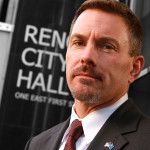Only 11 months until the next session of the Nevada Legislature, which brings the stirrings of newly hatched ideas for legislation.
One of the signs of the season was the first presentation to the directors of state agencies on what they should anticipate for their budgets — flat or a 5 percent decrease — and, of course, the filing date for candidates.
We also had the first meeting Wednesday of the attorney general’s Open Meeting Law Task Force, which will be discussing possible changes to NRS 241, Nevada’s open meeting statute.

Brett Kandt, an assistant attorney general who has done much of the lobbying for the office the last few sessions, is chairman of the task force. Attorney General Adam Laxalt sat in for half of Wednesday’s meeting as well.
It was mostly about getting organized and hearing suggestions for topics the group might want to discuss for a bill draft from the AG’s office. They’ll need to have substantial language ready for the Legislative Counsel Bureau by September. That may seem like a long way off, but it gives the group only a half-dozen meetings to put something together.
I’ve been a member of the task force for the last couple of sessions under then-Attorney General Catherine Cortez-Masto, and it offers valuable insight into how ideas for legislation come together.
In this case, the office changed from Democratic to Republican prior to the 2015 session. Nevertheless, the Open Meeting Law legislation that had been discussed for months before the election was proposed and supported pretty much as the task force had drawn it up. Of course, majority control of both houses of the Legislature also changed from Democratic to Republican, which meant new committee chairmen.
The task force at this point is mostly government attorneys, and it could use some more citizen representatives or journalists. Whatever recommendations come out of it won’t necessarily be unanimous. So far, though, they’ve been reasonable.
Topics for consideration
I suggested two topics for consideration: Whether contested-case hearings of the Public Utilities Commission are subject to the Open Meeting Law, as I’ve been disagreeing with their opinions since the arrest of Angel DeFazio last October. And how to deal with the increasing use of video-conferenced meetings.
George Taylor, the deputy AG who handles complaints of meeting-law violations, said he wants to talk about the “clear and complete” rule for agendas — the subject of two recent AG opinions — and when committees and subcommittees are covered by the law.
Other topics the task force may take up include whether requirements to post physical copies on bulletin boards is still relevant, and the provisions in the statute for criminal penalties puts public-board members at odds with the AG’s office.
Interestingly, one man who attended the Las Vegas location of the meeting asked the task force to consider allowing the Clark County School District to make more of its decisions in private. I won’t be supporting that idea.
I also asked Kandt if the task force may be widening its mission by addressing the open-records statute, as we had begun to do when we last met in 2014. He indicated we may.
Of course, it will be up to Laxalt whether anything the task force recommends will eventually wind up in a bill draft for 2017.
If you have any questions or Open Meeting Law concerns, let me know.
 Nevada Press Association The best in Nevada journalism since 1924
Nevada Press Association The best in Nevada journalism since 1924